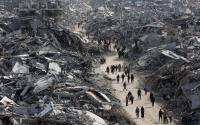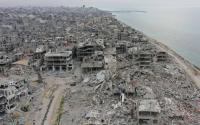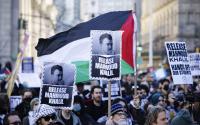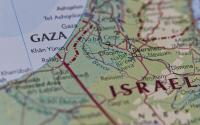Common Dreams / Published on Monday, October 25, 2004 by the Los Angeles TimesEdmund Sanders
The new United Nations envoy to Iraq warned Sunday that a U.S. offensive in Fallouja could further divide the nation as it struggles to prepare for January elections.
Ashraf Jehangir Qazi, the U.N. special representative for Iraq, also said the international body was prepared to mediate a peaceful solution in Fallouja, the rebel stronghold that has been under almost daily bombardment by U.S. warplanes.
"There is a concern with respect primarily to civilian casualties which are taking place and the impact it could have for the political process," said Qazi, a former Pakistani ambassador to Washington.
Asked if the U.N. had offered to intervene in the Fallouja standoff, Qazi said, "The U.N. is ready to do anything, anywhere, which can strengthen the political process through promoting national reconciliation."
Qazi expressed optimism that the Iraqi government would continue talks with leaders in Fallouja. Iraqi security officials said Saturday that negotiations had resumed after breaking down this month.
A leading Sunni Muslim group, the Muslim Clerics Assn., has threatened to boycott the election if U.S. and Iraqi government forces launch a major assault on the city. Sunnis represent an estimated 20% of Iraq's population.
On Sunday, radical Shiite Muslim cleric Muqtada Sadr, who has also threatened in the past to boycott the election, issued a statement criticizing the U.S. and supporting the residents of Fallouja. "I am with you hand in hand," he said.
Sadr and the Sunni group are viewed as critical players in Iraq's political process, and their refusal to participate in the election could raise serious questions about the vote's legitimacy.
Qazi said the U.N. hoped to convince all major parties to embrace the election process. Proposals to exclude certain restive cities, such as Fallouja and Ramadi, were no longer being actively considered, he said.
"The elections need to not only take place on time, but they've got to be credible, comprehensive and everywhere…. It would not be a positive development if elections were not held in a significant part of the country or a significant part of the population were not able to participate."
Officials with the U.S. military, which is continuing its bombing campaign in Fallouja and preparing for a larger assault, declined to comment Sunday on a possible U.N. role, saying they had not heard of any formal proposals.
Qazi said he soon expected to more than double the number of election experts in Iraq.
He rejected criticism that the U.N. wasn't providing the promised support to ensure that a vote could take place by Jan. 31.
"The circumstances here have not been very conducive nor congenial," said Qazi, who has spent about four weeks in the country since his appointment in July. "In fact, the security environment hasn't improved at all. Some would even contend it has deteriorated. But here we are."
Qazi said that an additional 15 U.N. staffers might soon be hired, adding to the 10 positions already approved to work in Iraq.
But the new staff would be sent only if adequate measures could be taken to protect them.
"We must at all times give priority to the security," Qazi said.
So far, only seven U.N. election experts are working in Iraq. The international body has agreed to send 35 staffers to the country.
The U.N. withdrew its staff last year after a car bomb killed 22 employees, including Qazi's predecessor, Sergio Vieira de Mello.
The new contingent is housed in a walled compound, guarded by the U.S. military, located inside the already well-fortified Green Zone. Staffers are rarely allowed to leave the Green Zone, and those who do are protected by nearly a dozen bodyguards.
In recent weeks, U.S. and Iraqi officials have criticized the U.N. presence as inadequate.
"We regret to say U.N. participation in this process is not up to the standards that we hoped for," Iraqi Foreign Minister Hoshyar Zebari said last week, noting that the U.N. sent more representatives to oversee elections in East Timor and Afghanistan.
Qazi called such comparisons inappropriate because the U.N. mandate in Iraq was to advise the Iraqi Electoral Commission, not to supervise the election.
"We don't run the show," Qazi said. "It was never envisaged that we would have a massive electoral presence here on the scale of what was in Afghanistan recently."
Qazi stressed that the staff issues had not delayed preparations for the election. "Yes, there are fewer than what we need to have, but we hope to build up," he said. "It's not such a critical shortage that it's severely disabling us from discharging our duty."
A spokesman for the Iraqi Electoral Commission praised the U.N. for its assistance and said the process was proceeding on schedule.
"The election will go on whether or not there are more U.N. experts," said Fareed Ayar.
Next Monday, more than 5,000 voter-registration workers are to begin verifying information with potential voters, using lists based on food-ration cards held by nearly every family. Political entities must register by Nov. 18 and field a list of candidates by Nov. 30.






